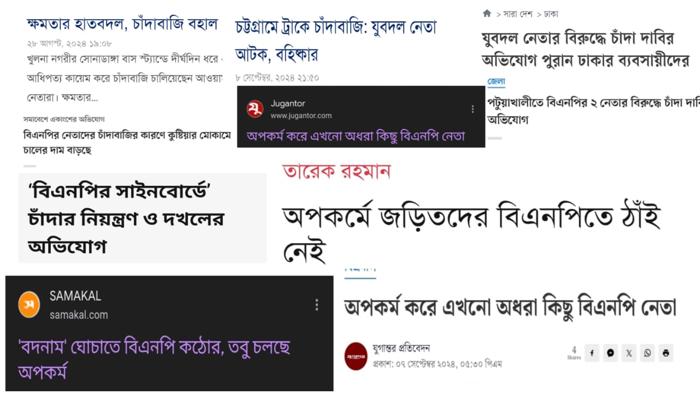Published: / Times Read

Over the past 17 years, the grassroots efforts of BNP in its movements have been remarkable. Party leaders and workers, sacrificing their homes, businesses, and personal lives, have relentlessly worked towards the success of the party's programs. In return, they have faced attacks, lawsuits, torture, and suppression.
Despite the growing instability of the past unelected government, BNP's central movement did not gain the momentum needed to achieve success. Various political analysts and media reports have pointed this out.
Even BNP’s Chairperson, Begum Khaleda Zia, has held the central leadership responsible for failing to stop the unelected governments of 2014, 2018, and 2024, and has praised the grassroots efforts.
Although the groundwork for the 24th January revolution had been laid earlier, BNP failed to mount a single-handed protest to oust the government due to lack of leadership and a lack of strong movement within the capital.
The importance of the central movement, especially in Dhaka, was demonstrated by the student protests in just 36 days. The main battlefield for revolution was Dhaka in July-August. Analyzing the previous failures, the student protesters concluded that maintaining control of the capital was paramount, which is why the victory of the student revolution on 5th August was possible.
After the change in context, while the divisions and smaller towns have been relatively calm, the praised grassroots workers are still showing reckless b ehavior. The actions of certain honest and principled grassroots leaders have caused bitterness and frustration.
Every day, the newspapers are filled with reports of extortion, land grabbing, internal party conflicts, and other illegal activities linked to grassroots workers in various districts and sub-districts.
Despite warnings, expulsion, and tough actions from the BNP high command, the grassroots workers are continuing their activities with little regard for leadership. One businessman, wishing to remain anonymous, said, "The situation is the same as before. I used to pay extortion money and still do. Where is the change?"
Another businessman added, "I used to pay 15 units per month, but now I pay 10 and get a discount of 5."
One businessman also mentioned that the current extortionists are in contact with the old ones, comparing how much they used to take and how much they are taking now. However, they predict that if they gain power, they may demand even more.
There are rumors in the markets and neighborhoods questioning what will happen if the current situation persists and whether it will worsen once the party comes to power.
Leaders are reportedly telling people who refuse to pay extortion money that they had to do the same for the past 17 years, so why is it a problem now?
When asked who is taking the extortion money, sources say it is a combination of political party members and administration officials dividing it up. However, most victims are pointing fingers at BNP.
In the language of the people, political parties, including the Awami League, seem to be walking down the same path as the ruling party, raising questions about the sacrifices made over the years. Why has there been so much bloodshed and struggle for change? What have the martyrs, like Abu Said Mughdho, sacrificed their lives for?
These issues are being closely examined by BNP’s high command. As the national election approaches, the delay is causing growing concern about the party’s internal dynamics. Many believe BNP is in a hurry to contest the elections.
The belief that BNP will win by a large margin and come to power once elections are held was logical before and immediately after the student protests. However, with time, this belief is turning into an illogical argument.
There is speculation that BNP's grassroots workers, without understanding the essence of the revolution, are increasingly involved in unethical practices that may harm the party’s chances in the upcoming elections.
Complaints against rebellious grassroots leaders have been piling up at the BNP central office, and despite expelling nearly 1,000 leaders and taking various disciplinary actions, the central leadership is struggling to manage the situation.
BNP’s acting chairman, Tarique Rahman, has been constantly warning the party leaders and workers about the challenges they will face in the upcoming elections. However, questions remain about whether the grassroots leadership is taking these warnings seriously.
If the election process continues to drag on and BNP’s grassroots members remain undisciplined, many predict that the party could pay a heavy price in the upcoming election. This could create an opportunity for other parties, including Jamaat, to benefit.